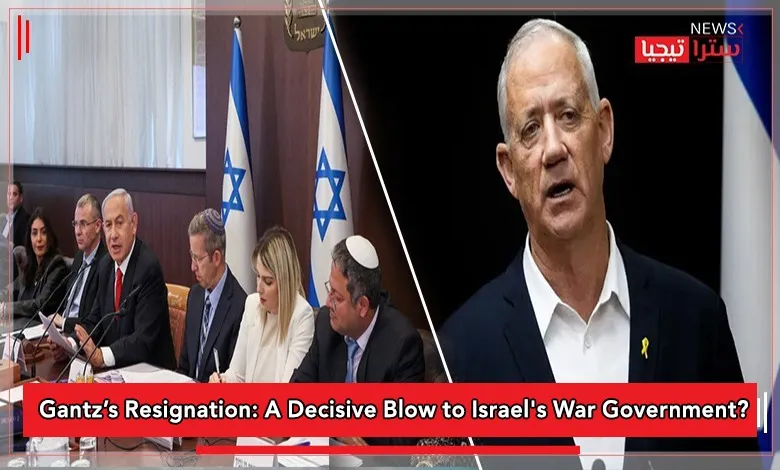By Sabreen Ajroudi, Department of Strategic Studies and International Relations 20-06-2024
Benny Gantz’s resignation from Israel’s war government was neither easy nor anticipated for Israel. This decision casts uncertainty over the government’s future and its impact on the war declared against Gaza since October 7th. Adding to the complexity is whether Israel can realistically enter early elections given the current timing.
What impact will this have on Netanyahu’s stance towards the Gaza conflict?
What are the potential repercussions for the war government?
What steps might the resigned politician take next?
Analysts are torn on the impact of Gantz’s resignation on current Israeli events. Some believe that it will not significantly affect the government, considering three scenarios: the continued tenure of the Knesset members, cessation of the war leading to the end of the war government, or reaching an agreement with Hamas.
Notably, the current Israeli government holds a slim majority with 64 seats out of 120 in the Knesset. This fragile majority suggests that Gantz’s resignation could be seen as a coup against the current government, potentially stripping Netanyahu of his parliamentary majority and leading towards early elections.
Regarding Gantz’s resignation from the Israeli war government, he announced it yesterday, Sunday. This move signifies the withdrawal of the only faction that could be classified as centrist within Netanyahu’s right-wing coalition. Gantz justified his resignation during a press conference, stating that it was due to the obstacles Netanyahu posed to achieving victory in the war and his policies that are inconsistent with this goal.
Gantz announced his resignation from the war government yesterday, Sunday, citing Netanyahu’s obstacles to winning the war and policies that do not align with this goal. Gantz plans to return to the opposition and support responsible decisions aligning with Israeli interests, emphasizing the need for elections to form a government that has the public’s trust.
Netanyahu, however, urged Gantz to reconsider, especially in these critical times, emphasizing the need to unite forces for victory. Conversely, opposition leader Yair Lapid welcomed the decision, calling for a rational government to restore security to Israeli citizens and address the issue of the captives.
Current predictions suggest that Netanyahu might dissolve the war government that Gantz left and rely on the existing government for decision-making. Avigdor Lieberman, leader of the “Yisrael Beiteinu” party, and Gideon Sa’ar, head of the “New Hope” party, who resigned in March, both rejected Netanyahu’s attempts to reconcile after they deemed Israel’s policies as failures in the war. Gantz’s resignation was anticipated.
The formation of the war government on October 7 aimed to manage the conflict, but significant losses in the war against Palestinian resistance caused internal rifts due to unmet war objectives. An Israeli politician indicated ongoing talks within Likud about possibly ousting Netanyahu in the Knesset, with Defense Minister Yoav Gallant’s stance being crucial.
Gantz is expected to lead a popular movement, supported by economic and union sectors, demanding a final resolution to the war government. This could benefit the Palestinian resistance by pushing Netanyahu, under pressure, towards an agreement with Hamas to calm the situation and avoid strengthening the movement’s position.
However, Netanyahu’s actions will depend on the Knesset’s stance. If early elections seem advantageous to him, he may escalate the war efforts, provided there is parliamentary consensus. Otherwise, continuing the war could be his choice if the opposite is true.
Gantz’s resignation appears deliberate, with future steps intended to leverage the government’s weak parliamentary majority. He might attract Likud members discontented with Netanyahu, although analysts suggest they may not switch sides. Nevertheless, such a shift is plausible given Netanyahu’s failures and international condemnations, alongside deep societal divisions in Israel.
This scenario might collapse if the opposition considers the implications of upcoming elections and the possibility of permanent exclusion from politics if they act against their party. Mordechai Kedar, an Israeli political science professor, highlighted that the critical issue for the government’s survival is the draft law compelling the Haredim to serve in the Israeli army. This sensitive issue, if surfaced now, could threaten the government’s stability, especially if Gantz exploits it or if the Supreme Court mandates the government’s dissolution.

